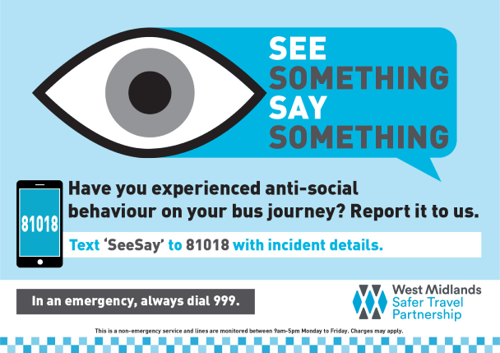Advice
Theft of passenger property
Keep your luggage and other belongings with you all the time when travelling on public transport or when waiting at the bus stop, tram stop or railway station.
Don't keep valuable items in bags - try and keep them on your person and out of sight.
Never leave items of property unattended – even for a few minutes – they could be taken by an opportunist thief.
If you have to store bags in luggage compartments whilst on your journey, make sure to keep an eye on them regularly during the journey, especially when people are getting on and off at stops or stations.
Bikes
Park your cycle where it can be seen in a designated parking facility. Try not to leave it in the same place every day.
Lock your cycle securely - lock both wheels and the frame to the cycle stand or another immoveable object.
Use high quality locking devices, such as those approved by Sold Secure.
Take removable items with you - such as lights, pump, panniers etc.
Permanently mark your cycle so that you can be traced if it is ever recovered after being lost or stolen.
Register your cycle with a recognised registration scheme such as BikeRegister.
Protect your phone, tablets and gadgets
Install a tracker application on your phone and tablet devices, which could help trace them in the event of a theft.
Stay alert and aware of what's going on around you when using your phone in public.
Register your gadgets at the Immobilise website - http://www.immobilise.com/.
Keep a record of the unique reference number (IMEI) on your phone or tablet. To get this on your phone, dial *#06#. For tablets, check your settings or consult your user manual.
Always use your phone's security lock or PIN number.
Use an ultra violet property marker to write your post code and house number on valuable possessions.
Vehicle crime
Park your car under a CCTV camera where possible, or in a well-lit, secure car park.
Keep your valuables out of sight. This includes sat navs, dashcams and other gadgets or belongings.
Lock your steering wheel if possible.
Remove all personal details from your car, such as your address and contact numbers.
Always double check your car before you walk away. Is it securely locked with nothing on display?
Watch our video below for some top tips on securing your vehicle:
Catalytic converter thefts
Catalytic converter thefts have increased both across the region and nationally, and drivers are being warned to stay alert and keep their car secure.
Many of our passengers drive to transport hubs and park their cars in public car parks, such as at train stations or surrounding areas. Help to deter thieves and keep your car secure by following the tips below:
- Park close to kerbs or fences where possible to make it more difficult for thieves to access the exhaust.
- Avoid parking half on the pavement - this raises the car up and gives easier access underneath.
- Try to park in secure car parks that are covered by CCTV.
- Consider having your catalytic converter marked, or fit a protective cover over the top. Stickers in the window to say this has been done will help to deter thieves.
- If your catalytic converter is bolted on, consider welding the bolts for extra security.
- Be aware of anyone looking suspicious working on cars in public areas – they may not be who they say they are.
You can also visit our Vehicle Crime section above for further tips on securing your vehicle.
If you’ve been a victim of catalytic converter theft, you can visit www.west-midlands.police.uk for advice on how to report, or text British Transport Police on 61016.
Always dial 999 in an emergency.
See something, say something
Have you experience antisocial behaviour (ASB) on your bus journey?
Report it to us.
Simply text the words “SeeSay” along with details of what’s happened to 81018.
You can also report an incident of antisocial behaviour online.

What happens next?
You’ll receive an automatic reply confirming that we’ve received your report.
A team of staff from West Midlands Police and British Transport Police investigate your report. This involves watching CCTV footage and working with bus operators to establish the circumstances. If you have provided your details in the report, we may contact you for further information.
Once the investigation is complete, the team use a variety of methods to tackle the nuisance behaviour. This can vary from issuing warning letters and Antisocial Behaviour Contracts to Community Protection Notices and Criminal Behaviour Orders which, if breached, can lead to further police action if the nuisance behaviour continues.
Let us know if you would like to be updated with the outcome.
What is antisocial behaviour?
Antisocial behaviour (ASB) covers a wide range of behaviours including smoking, littering, playing loud music, being rude to other passengers or staff, drinking alcohol in public spaces and other behaviour which causes others to feel uncomfortable or alarmed.
Nuisance behaviour can have a huge impact on passenger journeys, sometimes deterring people from travelling by public transport altogether.
Everyone has the right to travel without feeling harassed or alarmed. So if you See Something, Say Something to us.
